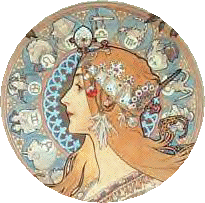


|
|
The personality can be viewed as a wheel whose 12 spokes, the signs of the zodiac, are in constant motion. At the center of the wheel is the Self, the unmoving, silent, tranquil eye of the storm. All of us are unconsciously attempting to reach the hub of the wheel, for it is here that we peacefully slow down to make calmer, wiser choices among our desires: mundane decisions about career, romance, family issues, health, investments.
The term archetype means any model or prototype. Jung defines archetype many different ways in his various works . . that an archetype is ". . . an instinctual pattern of behavior contained in the collective unconscious." It is "transcendent." In other words, archetypes are not just part of an individual's personal unconscious, but something greater. They transcend the individual and have an independent form of existence on the collective level.
![]()
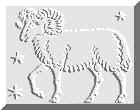

When the Greeks came to weave their magical mythic tales around the constellations which they inherited from Babylon and Egypt, they wove about the image of the Ram the story of the supernatural ram, sent by Zeus, which saved Phrixus and Helle from their wicked stepmother and carried them on its back toward Colchis. Helle fell off and drowned in the sea which was named Hellesport after her, but Phrixus managed to arrive intact at Colchis and came under the protection of King Aeetes, himself a magician and a son of the solar god Helios. Phrixus sacrificed the ram and hung up its fleece in a sacred grove guarded by a dragon, where it turned to gold; and it was this same golden fleece which Jason and his crew of Argonauts sought through many dangers. The fleece was sacred to Zeus, and once again we are presented with this unlooked-for connection between Aries and the fiery king of the gods. This golden fleece, and Jason's quest for it, seem to portray the theme of the slaying of the Old Father, and the quest for individual spiritual identity, which is at the core of the drama of Aries the Ram.
For Aries there is and can never be any other than one deity, "the hidden one" which manifests as his own phallic power. Because his battle is with God the Father, Aries must be fully conscious of what he is doing, and needs to reverence the deity against which he strives. He must be devout rather than merely angry.
The father-son drama will appear again later in the zodiac - in particular in the signs of Leo and Capricorn.
![]()

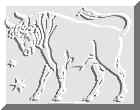
Three different mythic bulls claim the honor of being associated with Taurus. One is the white bull that carried Europa from her home in Tyre to Crete: this bull was Zeus himself, transformed into animal form for the usual purpose of abducting or seducing the woman of his choice. The second is a cow rather than a bull, the animal form of Lo, another of Zeus' paramours, whom Hera in her jealousy turned into bovine shape. The third and most famous is the Cretan bull with which Pasiphae, the wife of King Minos of Crete, fell in love, and which fathered the monstrous Minotaur that the hero Theseus had to kill.
The tyrant-monster is the challenge of Taurus, its dark face which must at some point be met in life. The earthy power which allows the tyrant to accrue his wealth, as Minos gathered wealth and power over the seas, is the gift of Taurus; but the dilemma lies in his relationship with the god, and which god it is he serves, the deity or himself.
But what is the bull, the symbol of power which must be dedicated to the god? The bull is not evil, but if it is allowed to run the man, then it may lead him to destruction, for he is at the mercy of his desires. It symbolizes the problem of the relationship between the ego and the instincts.
![]()
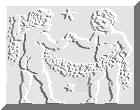

The myth of Gemini deals upon one of the fundamental conflicts of the sign - its inherent oppositeness. It is traditionally given that Gemini is a moody sign, inclined to swing from elation to depression. This is not surprising when we consider this myth, which portrays vividly the conflicting experiences of bondage to a mortal body with its sense of loss and death, and exaltation to the realm of spirit and eternal life.
Twins have always been regarded as something special and, if not related directly to divinity, yet as possessing some unusual power or mana which works in opposition, rather like the positive or negative poles of a magnet. There is, thus, in the concept of the twin a certain balance or equilibrium implied, a closeness and similarity without a complete identity; and ultimately, at least in mythology, a certain opposition is indicated which may lead through increasing hostility to any attempt by one twin to destroy the other. One twin personifies the light and the other the dark.
The danger is that if Gemini cannot face his own oppositeness and contrariness, the shadow (or the light) will inevitably land on siblings, friends, partners, or, most difficult of all, on a child of the same sex, who may then be doomed to act out the "bad" side of the parent because this badness must exist somewhere outside if the parent is to retain his/her complacency.
Often, one twin is the "extrovert" and confident and the other the "inhibited" and "neurotic one".
![]()


The glyph for Cancer is the male and female seeds. The archetype of Cancer is the Cosmic Womb in which the seeds of creativity grow and burst forth in diverse ways - biological, artistic or intuitive creativity, imaginative creativity, even business creativity. There is also, at the esoteric level, mystical creativity - giving birth to the child within. The Magna Mater is the most ancient personal manifestation of divinity found around the world.
The Moon is the ruler of Cancer. It represents feelings and emotions and your biological mother. In "The Dual Mother" C.G. Jung discusses the light and the darkness of the Great Mother Goddess. The light and dark phases of the moon are connected to the individual's experience with the mother, which in turn are at the root of his positive or negative mother complex.
Cancer begins with a karmic bond to Mother, than usually develops one with children, and at the end of life, concludes karma with the spouse.
![]()
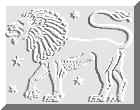

Leo is a dramatic, dynamic sign. Like Aries, Leo opts for a quest that involves fighting a giant and fearful odds against his success. Sometimes the giant is not a father but a father figure, with a giant reputation. His or her own emotions appear to be the major test for Leo. As with the other Fixed signs, betrayal by personal friends or family members hits him hardest, and s/he will fight for principle.
His inner quest for wholeness is of particular fascination to him. To be all we can be, "to strip away the layers of the onion and go to the core of who you are," is a quest worthy of a Leo. He is a becomer - a personality in the process of becoming him or herself.
Ego inflation is, in some cases, a tendency to identify with the persona, "I am the Messiah." Because the natal Sun sign is connected to ego consciousness and power, the strong (not the timid Lion) must often look at himself in terms of inflation.
![]()

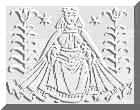
Balancing mind and body, or mind and matter, is central to the Virgo journey. Virgo prefers to focus on one thing at a time, to compartmentalize life. They will neglect the body in favor of the mind and then flip over. Health and their body are strong concerns, but they also need new facts, new skills, new challenges. When Virgo feels that his/her work is not useful, or meaningful, that s/he is no longer learning or growing in some way, his/her body begins to exhibit symptoms as a warning that a change is needed. The body is a barometer of the satisfaction or lack of it.
Virgo's search is to find meaningful service. But if s/he becomes too rigid about routine schedules, and takes its service too seriously, too rigidly, then the service profession may become a dictator. It may eventually come to close off Virgo's opportunities for mental and soul growth.
![]()
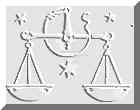

The Balance or the Scales, the glyph for Libra, represents equilibrium. Spiritually, we associate Libra with even-mindness as well as serenity, calm, and equanimity - something that takes a lifetime to accomplish. Many Librans are cheerful in adversity, cool and collected in time of crisis. This inner balance is to be admired and imitated.
Life's major issue for Libra is his/her relationships. He/she seeks to find their soul mate and live happy ever after. Many Libras will stay for years in what he or she perceives to be a disappointing love relationship rather than divorce the partner. Sometimes it is because of material comfort or their standard of living. Other times, they will stay because of the belief in the marriage commitment. Often, it is because of their fear of being alone.
![]()

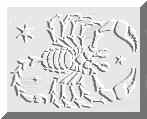
The planet Pluto, Lord of the Greek Underworld, rules the sign of Scorpio. Pluto rules the unconscious depths of the psyche where lies a residual of instinctual drives, emotional attachments, and compulsive-obsessive tendencies carried forward from past lives to the present.
The symbols of Scorpio are threefold: Serpent, Eagle, and Phoenix. The serpent symbol can mean devious or cunning as well as something rarified, or elusive, like the kundalini current in the astral spine. The Eagle is said to be a higher symbol for Scorpio than the Serpent and to represent the more highly evolved souls born at that time of year. The Phoenix stage symbolizes the accomplishment of obtaining true wisdom where one has become truly transformed.
![]()
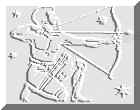

Traditionally, Sagittarius is associated with Spirit, expansion of awareness, aspiring to greatness, and the ability to motivate, inspire, or "fire up" others. The glyph, or symbol , for this archetype is the arrow. Archery is both a spiritual science and an art form. It is both mental and active and the archer's goal must be seen as distant or far off. With its confident belief in future greatness and the larger goal, Sagittarius sets a good example of vision and inspiration.
At what does the higher Sagittarian shoot his/her arrow? What is the highest target at which he could aim? The answer is . . . truth.
![]()

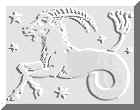
A Capricorn Sun sign person, a Capricorn rising, or and Angular Saturn person may have difficulty restraining himself from organizing the life out of projects, organizing the spouse's schedule within an inch of his or her life, or so thoroughly organizing the children's routines that they have little time left over to lay back and stare at cloud formations or to stop and smell the roses.
Capricorn almost always seems to find the personal father a disappointment, for the Father he seeks is nothing less than divine. But the wrath of the Father is a deeply significant issue for Capricorn. Saturn (ruler of Capricorn) is the Terrible Earth-father, and his devouring and destroying face (old age), the ogre aspect of the father, is a reflex of the person's own ego - derived from the sensational nursery scene that has been left behind. The father-son polarity, the avenging Lawgiver whose strict and structured rules of life collide with the lusty, libidinous goat-like desires of the son, exists within the one individual.
![]()
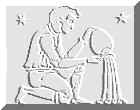

Symbolically, Aquarius is the ideal man, often artistically depicted as an angel, an immortal messenger to mankind from the gods, a perfected being who has liberated himself from the limitations of time and space so that he can fly between Heaven and Earth with his lofty concepts.
Angels inspire, guide, instruct, guard, protect, and sometimes struggle with us to convince us to do the right thing. They can appear suddenly with a momentous message, as Gabriel appeared to Mary; they can guard the gates of Paradise as they did for Adam and Eve; they can manifest with swords and trumpets on Judgment Day or dispute with each other as did Lucifer and Michael. They are definitely superior beings, intermediaries between God and man.
![]()

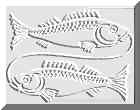
Though our modern zodiac represents Pisces as two fish swimming in opposite directions, through the ages many cultures chose the dolphin to symbolize Pisces. Known for its kindness, its mercy, and even for its healing qualities, it seems an appropriate choice for Pisces. Astrologically, Pisces is the sign of the actor or the chameleon who can play any role in any stage setting or environment of life.
We perceive Pisces as quite adaptable and without boundaries, as constantly merging its own ego into the ocean of people and circumstances around it, Pisces can and does draw lines based on its own intuitive grasp of black and white, right and wrong.
![]()
